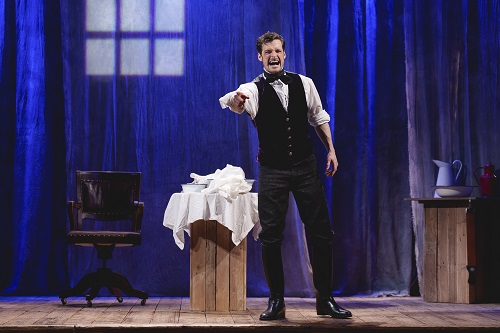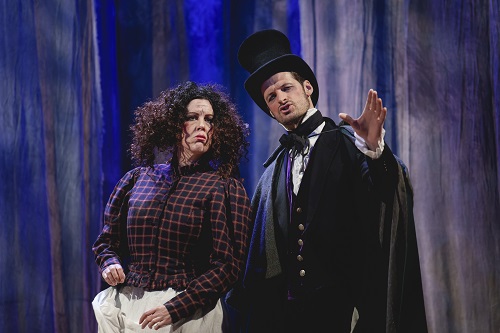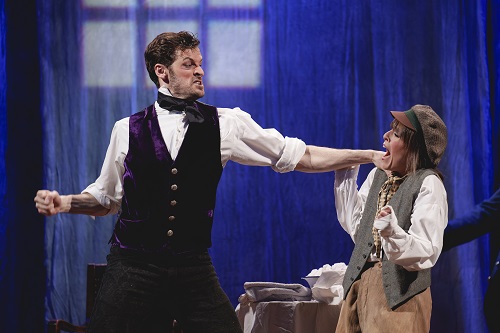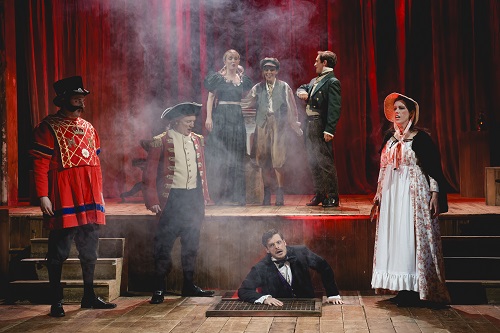Frankenstein’s ‘creature’, Count Dracula, Henry Jekyll-Edward Hyde: nineteenth-century fiction has furnished some notable literary monsters who continue to captivate the contemporary imagination. Sweeney Todd, barbarous barber and supplier of sickening meat-pie fillings, may well be the notorious of them all. He first appeared in print in 1846, in an anonymous Victorian ‘penny blood’ titled The String of Pearls: a Romance, which was serialised in a penny dreadful – a cheap journal containing lurid, gory tales intended for a working-class readership – in eighteen weekly parts from November 21, 1846, to March 20, 1847. In 2002, the bibliographer Helen R. Smith demonstrated that the principal author was James Malcolm Rymer, a prolific contributor to Edward Lloyd’s Salisbury Square fiction factory.
The String of Pearls was such a success with readers that before the final episodes in the serialisation had been reached, George Dibdin Pitt had been commissioned to produce a dramatised version for the stage and The String of Pearls, or, the Fiend of Fleet Street opened on March 1, 1847, at the Royal Britannia Saloon Theatre. It tells the story of a sailor, Mark Ingestrie (who goes by the name of Thornhill), who has arrived in London on a quest to deliver a priceless string of pearls to Johanna Oakley, the woman he loves. Her family have previously rejected him as a suitor, so he decides to spruce himself up with a trip to the barbers. Unfortunately, he selects the services of one Sweeney Todd, a man for whom cut-throat avarice calls for cut-throat actions. The disappearance of Thornhill, and his string of pearls, and the nervous mutterings of Todd’s apprentice, Tobias Ragg, trigger a murder hunt led by a motley crew – Colonel Jeffries, Johanna and her dauntless made Cecily Maybush, and Ben-the-Beefeater. As the bodies pile up, and Todd finds the string of pearls more liability than lucrative, the knot tightens on the fiend of Fleet Street.

The String of Pearls has now been adapted and edited by Jeff Clarke in what he calls not a ‘historical revival’ but ‘something new and effective, using music in the story-telling in a way that it would have been used in the mid 19th century’. And, where else to perform Victorian melodrama but in a Victorian music hall, especially if it lies not so far from the Britannia Theatre in Hoxton where it was first performed in 1847. So, Opera della Luna presented Dibdin Pitt’s blood-and-thunder at Wilton’s Music Hall, where the open-brick walls and shabby-chic charm did much to establish the necessary grimness and gloom. Just a few props – including a vampire trap – some gauzy hangings and Paul Knott’s atmospheric lighting design were all that was required to transport the audience to an urban Gothic world of sensational secrets and metropolitan mysteries.
This is an idiom that calls for gestures and expressions that are larger-than-life; or, at least it did when actors were playing in an venue as large as the Britannia, which Dickens described as ‘an immense theatre, capable of holding nearly five thousand people’. Even allowing for some characteristic authorial hyperbolic making an impact on those in the gods must have required an extravagant stage manner. Wilton’s is much more intimate but something of the style needs to be retained, and the super cast trod the fine line between heightening and hamminess with aplomb, conscious of the drama’s absurdities and artifice, but not unaffectionately so. Violent acts were dispensed with vicious speed. And, the overall structure was paced successfully, too, the long second Act (a bit too long, perhaps?), with its ever more ludicrously complicated plot twists – just about everyone gets tied up in the string of pearls’ knots – becoming increasingly pantomime-esque. The Wilton’s audience obliged with boos, jeers and cheers – in fact, they could have joined in the fun with even more abandon.

And what of the music. Well, there is no extant manuscript or score but we know that music accompanied the dialogue scenes, played by an ensemble of a dozen or so players and that some songs would be interpolated. For Clarke’s production, James Widden arranged music by contemporary composers who were working for the theatre at this time: Michael William Balfe (1808-70), Julius Benedict (1804-85) and Henry Bishop (1786-1855). There was only one song in the original script, a number celebrating Mrs Lovett’s pies, though it was common for other songs to be interpolated; here, songs were added for Johanna, Tobias and Sweeney, all drawn from Balfe’s opera Satanella of 1846.
The under-dialogue music is quite filmic and the eleven-piece band, alertly guided by Toby Purser, effectively complemented and enhancemented the stage action – including adding mimetic touches such a droll imitation of a creaking door-hinge from James Widden’s fiddle. But, speaking over music does present challenges. There was occasionally a tendency to ‘shout’ to ensure words were heard, adding to artificiality of the action. There’s also the problem of timing, and anticipating musical phrase-lengths. It was useful, then, that many of Opera della Luna’s regular team, whose musical and dramatic skills are equally sharp, were among the cast of seven (who between them shared the twenty roles). The cast also demonstrated that they know how to characterise with their voices – whether speaking or singing – and the results were consistently engaging performances from the whole team.

As the fiend of Fleet Street, Nick Dwyer faced his adversaries with defiantly jutting chin and haughtily hoisted shoulders. Much of the suspense depends on the contemporary trust in the barber’s knife and the trade’s association with blood-letting. As this Sweeney says, when Tobias quails at the site of a blood-splattered shop-floor: “Why should it frighten you fool? Does not a Barber shave, draw teeth, and bleed his customers, the gentleman wished me to breath a vein and did so – well? What then?” With a dastardly sweep of his cloak, or a fierce flash of his eye, Dwyer conveyed Todd’s absolutely confidence and conviction that he will triumph which only served to emphasise his abhorrent greed, it’s dark depths deepened still further by Dwyer’s rich baritone In Rymer’s tale, the narrator observes, “He looked like some fiend in human shape, who had just completed the destruction of the human soul” – a description that Dwyer brilliantly brought to life.
Sporting a wonderful array of Cruickshank-worthy costumes, the entire cast matched Dwyer’s persuasiveness. Matt Kellett was a strong Thornhill – as loyal lover, ghostly apparition and vanquishing hero – his baritone beguiling and true. As Cecily, Lynsey Docherty was feisty and fearless, dogged in her pursuit of her mistress’s ill-doer, dodging no risks, and daring in facing down Todd’s knife with a pair of scissors. Docherty’s comic timing and nuance, especially as Mrs Lovett, were as strong as her glossy operatic soprano. This was a stand-out performance. And, in a brilliant comic duet, she had no more trouble seeing off Paul Featherstone’s Reverend Lupin, a clergyman of Dickensian dreadfulness, whose leaning, leering and lasciviousness certainly matched Dibdin Pitt’s description of him as a ‘shabby, squinting, canting little parson’.
Caroline Kennedy was terrific as Tobias – a genuine gamine urchin, all wide eyes and quivering limbs on the surface, but stealthy and stoical beneath. Her aria was sung with beautiful lightness and clarity, one of the evening’s few moments of stillness and reflection. As the voracious Jarvis Williams, Matthew Siveter lauded Lovett’s delectables with stomach-churning enthusiasm. Madeleine Robinson had charm and chutzpah as Johanna.

Throughout, the cast superbly balanced humour and horror. And, at the close they brought forth the didactic element of Dibdin Pitt’s play, the original bill for which had announced: ‘The whole is indeed a picture of human nature replete, as human nature is, with LIGHT and SHADE! And cannot fail both to amuse and instruct.’
When the mob chases Todd to his death, the demon’s last words are, “Save me, save me, on every side, from every quarter they range like fearful fiendlike apes, they move and grin at me, mercy, mercy, I dare not expect none—I sho’d none, see the Shop, the Parlour, passes round me in quick and bleeding succession—the trap door yearns, numbers of hideous faces are looking upon me, save me, save me, save me, and in mercy forever visit my memory and suffer my Penitence to be registered My String of Pearls.” Yet, although I’d seen Sweeney Todd meet a violent end, as I left Wilton’s it wasn’t difficult to feel as if his ghastly laugh was still echoing around the gallery.
Claire Seymour
Colonel Jeffries/Reverend Lupin/Jonas Fogg (keeper of the lunatic asylum – Paul Featherstone, Thornhill/Mr Ruby (a lapidary)/Jean Parmine (employed by Lovett)/Bully Gregson (a bad ‘un) – Matt Kellett, Sweeney Todd – Nick Dwyer, Tobias Ragg/Tom Cutaway (an even worse ‘un), Mr Grant/Captain Rathbone/Jarvis Williams/Sneaking Joe (a worse ‘un) – Matthew Siveter, Johanna Oakley – Madeline Robinson, Cecily Maybush/Mrs Lovett – Lynsey Docherty; Director – Jeff Clarke, Conductor – Toby Purser, Designer – Elroy Ashmore, Wardrobe Supervisor – Kirsty Rowe
Wilton’s Music Hall, London; Tuesday 25th April 2023.
ABOVE: Lynsey Docherty (Cecily Maybush) an Nick Dwyer (Sweeney Todd) (c) Andy Paradise